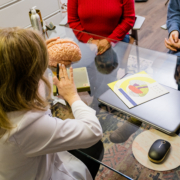11 holiday gifts for a loved one with dementia
As the holiday season draws near, many caregivers find themselves grappling with the challenge of selecting gifts for their loved ones living with dementia. This process can be particularly daunting, but with some thoughtful considerations, you can choose gifts that are both meaningful and beneficial.
- Limit the Number of Gifts: One of the first steps is to choose a limited number of gifts. Presenting too many options can overwhelm someone with dementia, leading to confusion or frustration. Instead, select a few well-thought-out items that cater to their interests and needs. This focused approach allows for a more enjoyable experience, enabling your loved one to engage with each gift individually rather than feeling inundated.
- Thoughtful Presentation: When it’s time to present the gifts, take your time and explain each item in detail. This moment is not just about the gift itself, but also about the shared experience. As you unwrap each present, describe its purpose and how it can be used. For instance, if you give a tactile sensory toy, explain how it can provide comfort and stimulate their senses. Even if your loved one may not fully grasp the details, your enthusiasm and care can convey the sentiment behind the gift.
- Manage Expectations: It’s crucial to maintain reasonable expectations regarding your loved one’s responses. They might smile politely and then set a gift aside, not fully understanding its purpose. Remember, their engagement may vary, and that’s okay. Focus on the joy of giving rather than the anticipation of a specific reaction.
- Simplify Choices: If your loved one enjoys puzzles, opt for simpler designs rather than complex, large-piece options. A 150-piece puzzle featuring a familiar landscape or beloved pet can be more engaging and less daunting than a 1500-piece challenge. This approach encourages success and satisfaction, as completing a simpler puzzle can evoke positive emotions and memories.
- Thoughtful Gift Options: When selecting gifts, consider items that promote enjoyment and peace of mind. Here are a few examples:
Digital frames
As a loved one’s memory begins to fade, images from the past can provide glimmers of recollection. Digital frames are a great way to provide this opportunity. Most of these products can be pre-loaded with different pictures of the family to scroll in a carousel. Frames from a company called Aura pull pictures directly from a smartphone.
Companion robotic pet
It can be difficult for loved ones with dementia to care for a living pet. An alternative: a companion robotic pet like the ones from Joy for All. Because these pets are designed to look and act like real critters, loved ones with dementia often connect with them and care for them as if they’re real.
Candle warmer lamp
These lamps enable loved ones with dementia to experience the wonderful scents of candles without having to worry about lighting or extinguishing flames. The lamps are designed like mini tanning beds; candles rest on a platform directly below the lightbulb, which melts the wax just as a flame would. CandleWarmers, Etc., has several options.
Automatic pet feeder
For loved ones with dementia, feeding living pets daily can sometimes be challenging to remember. Automatic pet feeders solve that problem. Most current models can be set to dispense varying amounts of food up to four times a day. Some, like Petlibro, can work off A/C power so your loved one doesn’t have to fiddle with changing batteries.
StoryWorth
It’s important to record family stories for posterity, and StoryWorth enables just that. The service converts written musings, transcriptions of audio and video interviews, and photos into books a family can keep forever. For families that comprise loved ones with dementia, the service is a great way to celebrate the past while it’s still accessible for all.
Dried flowers
Flowers make every living space beautiful. Often it can be hard for loved ones with dementia to remember to care for living flowers. Dried flowers are just as nice, and they last infinitely longer—in some cases up to five years. Several companies offer a wide variety of pre-arranged options. Nomon is one we like.
Kindle Fire
The Kindle, from Amazon, remains one of the best digital book devices on the market. Kindle Fire tablets with Fire OS5 or higher come standard with a text-to-speech feature that can read books aloud. This feature might make reading easier for loved ones with dementia in your family.
Tracking tools
It’s important to know loved ones with dementia are safe. A big part of that is knowing where they are. Mobile-enabled tracking tools can help. AirTags, which work with Apple operating systems, leverage Bluetooth and WiFi networks to broadcast their position in real-time. For Android users, the Life360 app does the same with GPS on cell phones.
Photocell nightlights
Using the bathroom at night can be quite an adventure for older adults who can’t see that well. It can be even more difficult for loved ones with dementia. Photocell nightlights are a great remedy; the lights illuminate automatically in the dark. Most of these lights last five to 10 years, making them a great investment. They are available at any hardware store.
Rideshare gift cards
Loved ones in the early stages of dementia need reliable ways to get around, and it’s not always possible for them to rely on family members for transportation. Gift cards from popular rideshare services such as Lyft and Uber can help. Rides are trackable to provide family members with peace of mind. Even better: They never expire.
Talking alarm clock
It can be a struggle for loved ones with dementia to remember when to take their medication, which is why the talking alarm clock from MedCenter is such a great gift idea. The clock has four alarms that remind loved ones to “Take Your Pills,” and a large button for loved ones to push once they’ve completed the requested task.
Familiar music
A playlist or CD of favorite songs from their past can evoke cherished memories, providing both joy and a sense of connection to their history.
Remember, as you navigate the gift-giving process this holiday season, prioritize simplicity, thoughtfulness, and emotional connection. By keeping your loved one’s unique needs in mind, you can create a joyful experience that celebrates their individuality and brings a smile to their face.









